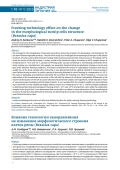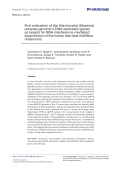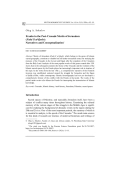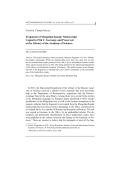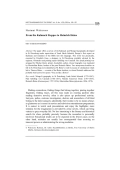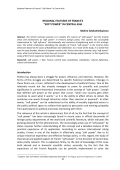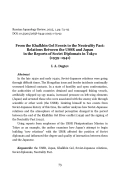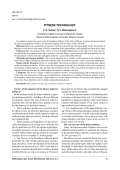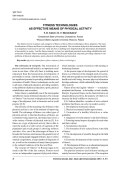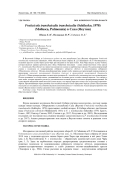The strategy for the development of domestic agriculture shows the prospects for developing a technology for frozen semi-finished vegetable products. The aim of the study is to investigate the morphological changes in the cellular structure of turnips and to determine the freezing mode that best preserves their native structure. The objects of the study are turnips of the Petrovskaya 1 variety, zoned in the Sverdlovsk region, harvested in 2023; samples frozen at temperatures of –18 °C and –29 °C, packed in a PET bag under vacuum and without it. The freezing coefficients of the study samples are calculated and micrographs are presented demonstrating morphological changes in turnip samples under different freezing conditions. The authors presented the results of organoleptic evaluation and natural weight loss of the study samples after defrosting. It was determined that the optimal method of cryoprocessing of semi-finished turnip products for public catering is blanching followed by shock freezing at a temperature of –29 °C. The type of packaging and preliminary blanching did not affect the freezing rate. When freezing in a vacuum, the destruction of the morphological structure of the cell with the release of cell juice is noticeable; differences in the volume of destruction of the cell structure between the presented samples are insignificant, which indicates in favor of vacuuming when packaging semi-finished products. It was revealed that the smallest weight loss during defrosting is observed in turnip samples packaged without vacuum at a temperature of –29 °C. The test samples subjected to preliminary blanching and subsequent freezing at both –18 °C and –29°C retained their color, while the unblanched samples had a grayish tint. It was determined that turnip cells are subject to minor destruction of the morphological structure during blanching followed by freezing, but blanching allows preserving the marketable appearance of the semi-finished turnip product
In recent decades, infection of the European honey bee Apis mellifera with the highly virulent microsporidium Vairimorpha (Nosema) ceranae has become globally prevalent. It causes serious losses in beekeeping worldwide and requires new approaches to control bee nosemosis. Since this intracellular parasite has retained components of the RNA interference pathway, double-stranded RNA (dsRNA) treatment of insects may be effective in controlling V. ceranae infection. Inhibition of microsporidia growth in bees fed with 1.8 or even 0.04 μg dsRNA per ml of sugar syrup has been reported in the literature. Considering the crucial role of the genome’s DNA replication machinery for any cell, we synthetized in vitro dsRNA fragments of four V. ceranae genes encoding two subunits (delta and epsilon) of DNA polymerase, helicase and topoisomerase II and fed them to the infected bees with a relatively low dose of 1 µg per ml of sugar syrup. Surprisingly, PCR and qPCR analyses of V. ceranae growth in the midgut of dsRNA-treated insects at 7- and 12-days post-infection revealed neither inhibition of microsporidia growth nor downregulation of target genes. It is worth noting that we collected worker bees of different ages directly from a hive, to simulate the conditions during colony treatment in apiaries. At the same time, newly emerged insects reared in the laboratory were used in the successful experiments mentioned above. This suggests that bee housing conditions as well as gut content may affect the efficiency of RNA interference and requires further increase in dsRNA doses or their mixing with nanoparticle carriers.
Настоящее исследование посвящено проблеме выделения FMV-игры как особого цифрового медиаформата. В ходе работы выявляются уникальные особенности FMV-игр, которые отличают их от кино и классических видеоигр. В статье FMV-игры рассматриваются как противоречивый и дискуссионный феномен. Сделана попытка ответить на вопросы, действительно ли данная форма представляет собой уникальное явление и возможно ли ее отнести к отдельной форме медиа. Актуальность темы обусловлена тем, что FMV-игры - яркое явление в индустрии интерактивных развлечений, которое имеет свою аудиторию, специфику и способы взаимодействия с пользователем. Это создаёт необходимость в ее четком теоретическом осмыслении и выделении ее в качестве новой формы гибридного медиа. В процессе написания статьи были использованы методы сравнительного, исторического и структурного анализа FMV-игр, что позволило выявить их особенности и специфику их эволюции. Научная новизна исследования заключается в историческом анализе и типологизации FMV-игр по принципу влияния FMV элементов на структуру произведений; в структурном анализе FMV-игры и попытке определить FMV-игру в качестве отдельной формы гибридного медиа, которая отличается от кинематографа и традиционных видеоигр. Автором было проведено аналогичное исследование в рамках анализа природы интерактивного фильма. Настоящее исследование также затрагивает структурные отличия FMV-игр от интерактивного кинематографа. По итогам исследования удалось достигнуть следующих целей: обнаружить значительные различия между FMV-игрой, кино (в том числе с его интерактивным ответвлением) и традиционными видеоиграми; предложить классификацию FMV-игры в качестве «гибридного медиа»; проанализировать роль пользователя при взаимодействии с современной FMV-игрой, которая отличается как от привычных ролей геймера, кинозрителя, так и от специфической роли фокализатора (в интерактивном кино).
The article presents a historical study of two theories of economic management. In the course of development of world economic research, two cardinally different methods of economic regulation stood out. The first one is considered in detail by A. Smith in his seminal work “Wealth of Nations”. The second method is associated with the works of the English economist J. M. Keynes, who scientifically substantiated the impossibility of self-regulation of the economy and the need for public policy to balance aggregate demand and supply, overcome crises and help stabilize the economy.
Merits of Jerusalem (Fada’il al-Quds), which belong to the genre of Islamic sacred geography, constitute a valuable but still under-researched source for studying the memory of the Crusades in the Levant and Egypt after the expulsion of the Crusaders from the Holy Land. Analysis of the most popular works of this genre created after 1291 shows that in the subsequent centuries the theme of the Crusades and the violation of the Islamic sacred spaces by the Franks played an increasingly important role in treatises of this type. In the works from the late 15th c., a comprehensive narrative of the Frankish invasion was established, centered around the struggle for Jerusalem and the figure of Ṣalāḥ al-Dīn, while contemporary Islamic historiography had not yet developed a comprehensive history of the conflict with the Franks at that point. The works of the period under review also blame the Franks for interrupting the transmission of Islamic knowledge.
The article introduces three previously unknown fragments of 17th c. Mongolian Kanjur manuscripts. While the original folios have been lost, their texts are preserved in handwritten copies produced in the 19th c. by an unidentified German scholar. These copies became known in 2021 after being admitted to the Manuscript Department of the Library of the Russian Academy of Sciences. This article focuses on the Mongolian text of the fragments, its identification, and a brief commentary on the trustworthiness of the handwritten copies.
The paper offers a survey of the Kalmuck and Mongol typography developed in St. Petersburg under supervision of Isaak Jakob Schmidt, Europe’s first expert on Kalmuck and translator of the Bible into this language. This work was practically, executed by Friedrich Gass, a designer, in St. Petersburg, probably advised by the engineer, Orientalist and printing expert Schilling von Canstadt. The actual printing was arranged by Nikolaj Grech, printer, bookseller, author, whose biography was translated by Maximilian Heine, brother of the poet Heinrich Heine. Two anonymous booklets on life in St. Petersburg were identified as M. Heine’s work by means of a dedication which led to Therese Heine — a cousin of the Heine brothers, to whom Heinrich addressed his probably best known love poem “You are like a flower”.
Maqolaning asosiy maqsadi “yumshoq kuch” ning mohiyatini va Frantsiya tashqi siyosatidagi “yumshoq kuch” ning ustuvor yo’nalishlari va mexanizmlarini tahlil qilishdir. Ushbu mamlakat o’zining “yumshoq ta’sirini” xalqaro miqyosda muvaffaqiyatli amalga oshirdi va ushbu strategik sohadagi ishlarni kuchaytirishda davom etmoqda. Maqolada Qozog’iston va O’zbekiston holatlari asosida Markaziy Osiyo o’lchovidagi frantsuz “yumshoq kuchi” ning o’ziga xos xususiyatlarini aniqlashga urg’u berilgan. Tadqiqot natijasida ta’kidlanishicha, so’nggi o’n yilliklarda Frantsiya kabi G’arbiy Evropa mamlakatlari “yumshoq kuch” vositalaridan faol foydalanmoqda, Markaziy Osiyo mamlakatlari esa ushbu tashqi siyosiy resursni hali o’zlashtirmagan. Shu munosabat bilan frantsuz tajribasini o’rganish juda dolzarb ko’rinadi.
In the late 1930s and early 1940s, Soviet-Japanese relations were going through difficult times. The Mongolian issue and border incidents continually worsened bilateral contacts. In a state of hostility and open confrontation, the authorities of both countries detained and rummaged fishing vessels, artificially whipped up spy mania, increased pressure on left-wing elements (Japan) and arrested those who were associated with the enemy side through scientific or other work (the USSR). Limiting himself to two events from Soviet-Japanese history of this time, the author analyzes how Soviet-Japanese relations and the atmosphere of mutual perception changed in the period between the end of the Khalkhin Gol River conflict (1939) and the signing of the Neutrality Pact (1941).
Using reports from employees of the USSR Plenipotentiary Mission in Tokyo as an example, the author examines how Japan’s attempt to begin building “new relations” with the USSR affected the position of Soviet diplomats and influenced the degree and quality of interaction between them and the Japanese.
The author examines the trends in the development of fitness in the cities of Russia. Analyzes the factors behind the increased popularity of fitness and describes popular and new types of this direction. Relevance. Sports are essential for every person. It is fitness areas that have become popular for the vast majority of Russians, as they have a wide range of choices depending on the preparedness, goals and physical form of the client. Purpose, tasks. The purpose of the work is to review scientific publications on this topic. Get to know the factors behind the development of the fitness industry. Learn the fitness system directions and their meaning. Reveal the importance of fitness bracelets and applications for a successful healthy lifestyle. Materials and research methods. The research materials were scientific sources placed in the scientific electronic library (https://elibrary. ru). Research methods: study of scientific literature, review of scientific publications. Results and its discussion. Fitness is an affordable, interesting and effective method of maintaining a figure, health and emotional stability. All this causes the development of not only new directions, but also the widespread introduction of these programs into the daily life of Russian citizens. More than half of the people in Russia are engaged in this physical activity, which makes this industry continue to develop.
Conclusion. The desire to engage in fitness has different motives, from maintaining health to imitating your favorite idols. All of them have made a good contribution to maintenance of a healthy lifestyle by citizens. In turn, the popularity of this direction gave a huge impetus to the development of fitness. Practically useful properties of fitness have been identified even for athletes and professional players.
The abstract review examines such categories of fi tness as fi tness, fi tness technologies, fi tness programs. The main classifi cations of fi tness and fi tness technologies are also presented. The restoration of physical and emotional health is an important social issue in our time. After all, there is nothing more important than the harmonious development of personality in society. And the fi tness industry, in turn, has signifi cant potential in providing rehabilitation and restoration of health. Fitness technologies can be used in all types of physical education, providing solutions to the problems of physical education, sports, physical rehabilitation and recreation.
В Восточной Сибири в Олёкминском районе на юге республики Саха (Якутия) обнаружена Fruticicola transbaicalia transbaicalia (Sсhileyko, 1978). Моллюски были собраны П. Д. Габышевым и П. Р. Ноговицыным у подножия крутого склона берега реки Чара при впадении в неё реки Токко. Река Чара впадает в реку Олёкма, которая является правым притоком реки Лены. Найденная популяция - самая северо-восточная точка ареала F. t. transbaicalia. Вид обитает на глинистом каменистом склоне на карбонатных породах. На склоне разреженный сосняк с подлеском из можжевельника сибирского (Juniperus sibirica) и вздутоплодника сибирского (Phlojodicarpus sibiricus). Мохово-лишайниковый ярус развит слабо, травяно-кустарничковый покров разрежен и представлен лапчаткой кустарниковой (Dasiphora fruticosa) и кровохлебкой лекарственной (Sanguisorba officinalis). Общие размеры раковин соответствуют размерам B. t. transbaicalia, указанным для этого подвида ранее. На всех раковинах по четыре линии, указывающие на остановки роста в осенне-зимний периоды. Это говорит о пяти зимах, которые прожили улитки до достижения ими половой зрелости и полного формирования раковин. На единственной найденной живой молодой улитке видно, что окраска переднего конца тела и щупальца коричнево-чёрные. Просвечивающее через раковину тело моллюска пёстрое. Оно и определяет окраску улитки. Исследования последних лет поставили под сомнение видовую самостоятельность F. transbaicalia. Анализ распространения этих видов в Якутии может помочь в решении этого спорного вопроса.
